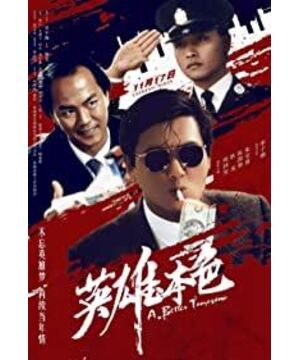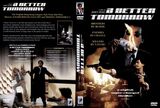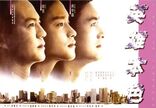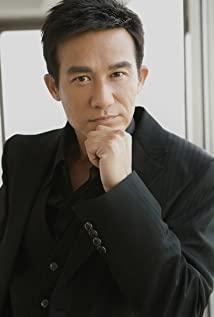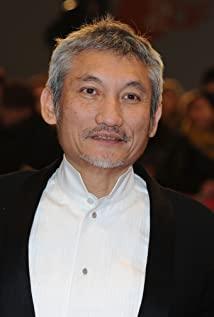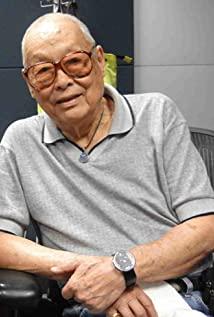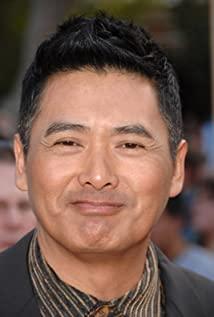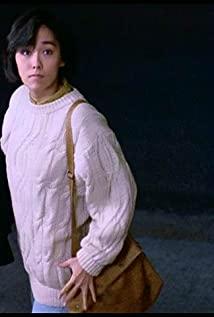Before talking about the film itself, please imagine this image: wearing a black trench coat, a matchstick in his mouth, wearing big sunglasses, combing his shiny hair, walking on the endless streets. Anyone's first reaction will think of a tough guy image of that era. Maybe in today's emerging aesthetic trends, this is not your ideal handsome guy, but on the streets of Hong Kong in 1986, you can see countless age groups imitating this suit. Just as the Spring Festival Gala in that era could lead the trend in the mainland, Hong Kong movies also set off a frenzy across Asia. The word "Martial Arts" came to be called "Kung Fu" in Cantonese cultural circles. In this extremely densely populated area, film culture naturally permeates every corner. So far, the first impression of Western film critics mentioning Hong Kong movies is the word "Kung Fu". The legendary Shaw Brothers dominated the Hong Kong film market for decades. Until the unusual time of the 1980s, traditional kung fu films slowly began to decline, and the "Once Upon a Time" series, which was badly shot by countless Hong Kong directors, also At the same time, Hong Kong's social and economic development is rapidly developing, and various problems in modern society have triggered people's nostalgia for and pursuit of morality and righteousness in the past. However, looking at the film culture at that time, vulgar comedies were still the mainstream. It is destined to be a time for talented people to show their talents. John Woo is a traditional studio director, that is to say, according to the studio system, he starts from the on-set record, and then goes to the assistant director, so that he finally takes the director's position. John Woo's master is the famous director Zhang Che. During the few years he followed Zhang Che, he learned from his master how to show the violent scenes to the extreme. However, in the years when John Woo was actually a director, he followed the producer's instructions. He was required to make only some hilarious comedy films, although he has always tried his best to make his own style from the film, but was limited by the script and production process. Until later, with the help of Tsui Hark, he directed this "The True Color of Heroes", which established his own directing style and aesthetic characteristics. It's worth mentioning that this movie seems to be a party for unpaid boys. Chow Yun-fat was known as "box office poison" at that time, and almost no one dared to use it. Dillon, who is a little older, is no longer as brave as he was in the past, and was abandoned by Shaw Brothers, and director John Woo was also sent to Taiwan by his own company, almost losing the opportunity to direct. The whole story of "The True Colors of Heroes" is very simple, and the construction of characters is the classic "two heroes" model in Hong Kong. The underworld elder brother Song Zihao (played by Di Lung) and his brother Xiao Ma (played by Chow Yun-fat) were in love with each other, but they were helpless to be framed. Unfortunately, the two brothers were reunited. If I had to summarize it briefly, it would be: "The Story of Three Men", which is one of the characteristics of director John Woo. However, in his films, women often appear as unnecessary roles. To put it more vulgarly, there should be a wife here, come. There should be a girlfriend here, come. If it is put into the classification of classic Hollywood films, the series represented by "The True Color of Heroes" should belong to robber films, and most local film critics prefer to call them "hero films". It must also be a story between men and men. deeply connected. Before the advent of "The True Color of Heroes", Hong Kong directors who are known for kung fu films have learned to use different tricks to win the audience's adrenaline, such as hanging Weiya, setting the trampoline, and fast cutting, dazzling knights The image can then fly around on the screen. In the eyes of many people, real kung fu has to use real guys, which makes sense. But John Woo doesn't think so. In his autobiography, he mentioned that he was deeply influenced by musicals when he was young, and his father looked down on movies, thinking that the movies were hypocritical and the stage was real. So in "The True Color of Heroes", we unexpectedly saw a very atmospheric Rush scene, Wu Yusen did the opposite and adopted an upgraded lens. Combined with the shocking pyrotechnic blasting effect and the pictures of the martial arts being shot into the air, the audience discovered that the original violent picture can not only be fast, but also slow, and the slowness is beautiful. Correspondingly, the bullets of the pistols in the film are unlimited. If it is not necessary, there is no need to change the magazines at all. The protagonists will definitely put several shots at one person. At the same time, John Woo draws on the traditional Chinese image of knights. Let Xiao Ma confront the enemy with two guns in his hands. All these things in the sense of form are the best preparations for the display of violence, and make the action scenes appear smooth and full of dance rhythm. In "The True Color of Heroes" "After that, many directors in the West began to learn to let the protagonists hold dual guns, and even this has affected our current anti-war dramas. If you look closely, you will find that the Eagle in his hand is just replaced by a box gun. . Woo had a downtrodden family when he was a child, and spent most of his childhood in a local mission school, so for him religion is an important part of faith. According to what he mentioned in his autobiography, he would go to the church to pray every weekend, which would give him a special sense of security. Such an experience is destined to affect a director's creation. In John Woo's films, we can often see a large number of white pigeons flying through the camera. A large number of white seabirds also appeared before the final climax in "The True Color of Heroes". The flying picture is the epitome of a symbol of Western religious culture. In a scene waiting for Ah Cheng to come in the temple, Song Zihao asked Xiao Ma if he believed there were gods in the world. Xiao Ma paused and said that he is a god, and the one who can control his own destiny is a god. Looking at this film, Brother Xiao Ma has always been eager to rise up, hoping to dominate his own destiny, but unfortunately, he was unfortunately shot to death by random guns out of love. The scene where Brother Xiao Ma was shot several times will surely not be forgotten by Hong Kong film fans no matter how many years have passed. The above is a theme that the film wants to discuss: how much you can give for love. The two words "Qingyi" can fully describe the direction of the whole film. About 15 minutes into the beginning of the film, Brother Xiao Ma told the life experience of himself and Song Zihao in the ballroom. After that, out of love for his younger brother, Song Zihao wanted to finish the last business deal. Framed, and the little brother wanted revenge out of love, but he became a lame man. In the end, out of love, the three teamed up to deal with Ah Cheng, and Brother Xiao Ma sacrificed. Around this word "righteousness", John Woo can be said to have made great efforts to create all kinds of difficulties for the protagonist. We can see that Brother Xiaoma's status in the company has plummeted because of his lameness, and Song Zijie cannot be promoted because of his brother Song Zihao's background. On the one hand, Song Zihao was hoped by the little brother who was eager to join hands to create a new career, and on the other hand, he was incomprehensible and troubled by his younger brother's police status. When the eldest brother Cheng asked Song Zihao if he was willing to work for the company again, the sentence he shouted, "On one side is my friend, and on the other side is my brother. If I choose, how can I have the face to walk out of this door?" Maybe it is the character's inner contradiction Real photo. Whether a movie looks good or not depends on whether there is a "knot", and then how the director interprets it. Brother Xiao Ma and Song Zijie are two extremes respectively. Brother Xiao Ma gritted his teeth in the bar scene at the beginning and swore that he would never let others point guns at his head again. Ye Jing said, "I'm not trying to prove that I'm better than others, but I just want to tell others that what I've lost must be taken back with my own hands!" The initiative after the drop. And Song Zijie has always drawn a clear line with his brother Zihao after suffering the pain of losing his father. He is very active, and at the same time stubbornly does not believe in his brother, which adds instability to the character, and dangers follow Come. Song Zihao lives between the two. He is eager to find a balance point, but fate often cannot be chosen. Interestingly, both of them chose Song Zihao in the end. With a gun without bullets, the older brother had no choice but to face the cunning older brother Chengshi and handed over his police gun. I personally think that the handling of the three-person relationship in the film is very clever. It does not directly resolve the contradiction, but transforms the contradiction. At the same time, the word "emotion" is strengthened in this process. The English name of "The True Color of Heroes" is A better tomorrow. It is estimated that many friends will feel that it is not as powerful as the four characters of heroic character. But if we look at it from another angle, every hero in the film is actually romantic. This kind of romance is not exaggerated in the paper sense, but a kind of free and easy and relieved, just like Xiao Ma put his arms around a woman in the Fenglin Pavilion Hotel, laughing and lingering with her, and skillfully hiding a gun in a flowerpot with the other hand. In the ensuing revenge shootout, he finished shooting the bullets, and unhurriedly shook his collar and drew the gun from the flowerpot. Song Zihao finally took out the handcuffs from his brother's pocket and handcuffed himself, smiled and told his brother that he just walked a different way. Heroes are romantic, and what they want to do is not to show their individuality, but to stay true to their own heart. In other words, they all have expectations in their hearts. At least, they feel that the road ahead will not be too bad, and even if it is, they have already made adequate preparations. Before the final climax of the film broke out, when Song Zihao went to his brother and sister's school to hand over the evidence, the school children were singing "Tomorrow Will Be Better". When Song Zihao disappears into the shadows accompanied by singing, we can predict the arrival of a storm. Here is the "violent aesthetics" of John Woo-a romantic hero who always has his own solution. The question of "tomorrow" seems to be in line with the problems faced by Hong Kong people in that era. In the more than ten years after the Sino-British joint declaration was signed in 1984, Hong Kong people were discussing "where to go", while the economy of Hong Kong society in the 1980s Prosperity has buried countless possibilities for this. Facing the front, people worship the courage and Ling Ran of heroes. Yes, people need this kind of guidance. In those days, after how many people came out of the cinema, a few people called for a dozen beers on the street, drunk and asked the boss for a matchstick. Occasionally someone excitedly took the bottle and vomited bloody loudly, and someone grabbed the bottle and said : "I hate people pointing a gun at my head the most." After the big sale of "The True Color of Heroes", Hong Kong movies have always followed the trend and the shortcomings of plagiarism and copying have been revealed. In the following years, various police and gangster movies The endless emergence of gangster films has satisfied people's different tastes for heroes. Don't care too much about whether the sunglasses are cool enough or whether the matchsticks are like toothpicks. Think about it carefully, there is no shortage of heroes in every era, but the charm of the movie lies in what the protagonists do. Things can always prove that "people are doing, God is watching". This sentence allows them to do it freely, unlike us sometimes just to comfort ourselves. Laughing Yu After "The True Color of Heroes" was a big hit, Hong Kong films have always followed the trend and the disadvantages of plagiarism and copying have been revealed. In the following years, various police and gangster films have emerged one after another to satisfy people's different tastes for heroes. Care about whether the sunglasses are cool enough and whether the matchstick bites like a toothpick. Thinking about it carefully, there is no shortage of heroes in every era, but the charm of the movie is that what the protagonists do can always prove that "people are doing, God is watching". This sentence allows them to do it freely, unlike us sometimes just to comfort ourselves. Laughing Yu After "The True Color of Heroes" was a big hit, Hong Kong films have always followed the trend and the disadvantages of plagiarism and copying have been revealed. In the following years, various police and gangster films have emerged one after another to satisfy people's different tastes for heroes. Care about whether the sunglasses are cool enough and whether the matchstick bites like a toothpick. Thinking about it carefully, there is no shortage of heroes in every era, but the charm of the movie is that what the protagonists do can always prove that "people are doing, God is watching". This sentence allows them to do it freely, unlike us sometimes just to comfort ourselves. Laughing Yu
View more about A Better Tomorrow reviews


